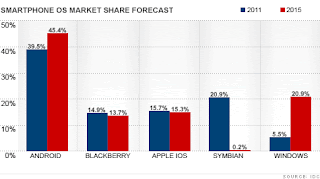WIndows Phone lead over Iphone!!!
 NEW YORK (CNNMoney) — Predicting trends in the technology field can be a fool’s errand, but forecasting the rapidly changing wireless space is particularly perilous.Nevertheless, the brave souls at IDC offered up one of the wackier — but quite possible — tech forecasts in recent memory: They predict that Microsoft’s all-but-dead-on-arrival Windows Phone 7 platform will outsell BlackBerry and, yes, the iPhone by
NEW YORK (CNNMoney) — Predicting trends in the technology field can be a fool’s errand, but forecasting the rapidly changing wireless space is particularly perilous.Nevertheless, the brave souls at IDC offered up one of the wackier — but quite possible — tech forecasts in recent memory: They predict that Microsoft’s all-but-dead-on-arrival Windows Phone 7 platform will outsell BlackBerry and, yes, the iPhone by
2015.The reason for the incredible 67% projected annual growth rate is Microsoft’s recently announced partnership with Nokia, the world’s largest handset maker. Nokia (NOK) holds a 33% share of the smartphone market, according to IDC, but that share has fallen dramatically from the 48% it held in 2006, the year before Apple introduced the iPhone.Four years from now, Microsoft (MSFT, Fortune 500) will have gained 21% of the smartphone market, IDC forecasts, up from just 5.5% at the end of this year. That’s good enough for second place,trailing Google’s Android OS. Windows Phone 7 is currently mired in fifth place.The Finnish mobile phone giant is dropping its Symbian smartphone OS in favor of Windows Phone 7. IDC predicts that the deal will pay off very well for Microsoft.”Microsoft has steadily lost market share, while other operating systems have brought forth new and appealing experiences,” said Ramon Llamas, analyst for IDC. “The new alliance brings together Nokia’s hardware capabilities and Windows Phone’s differentiated platform. By 2015, we expect Windows Phone to be the No. 2 operating system.”Good for Microsoft, perhaps, but the tech consultancy believes the partnership won’t be as favorable for Nokia: By the end of this year, Symbian’s market share is expected to slip to from 33% to 21% — the same share of the market that Microsoft is expected to control in 2015.Of course, the overall smartphone market will be much larger by then, growing at an annual rate of about 20%, IDC predicts. Still, Nokia won’t be too happy if the result of Microsoft deal is that it simply stops hemorrhaging market share. It’s looking for a turnaround, and banking on the Windows Phone 7 deal to open the door to the North American market.Meanwhile, Google (GOOG, Fortune 500) is expected to continue its rapid and stunning rise to the top. IDC expects Android to have a 39.5% market share by the end of the year, which would be nearly double that of its nearest competitor, Nokia’s Symbian.But over the next four years, IDC believes that growth will taper off somewhat. It foresees Android holding a 45% share of the market by 2015.”For the vendors who made Android the cornerstone of their smartphone strategies, 2010 was the coming-out party,” said Llamas. “This year will see a coronation party.”Apple (AAPL, Fortune 500) and Research In Motion (RIMM) are expected to stagnate. IOS, which powers the iPhone, iPad and iPod Touch, is forecast to maintain its roughly 15.5% market share, while BlackBerry is projected to slip to 14% from 15%.It’s important to emphasize that even though smartphone predictions are fun to discuss, they rarely play out as envisioned. Just six months ago, IDC predicted that Android’s share would grow to 25% by 2014 (try early 2011), iOS would slip to 11% and Windows Mobile would have 10% of the market in three years.
And, of course, the operating system that’s currently running the tabledidn’t even exist three years ago. The game-changing iPhone was unveiled just four years back.So who really knows what smartphone systems we’ll be using in 2015 — or even what gadgets we’ll be running them on?